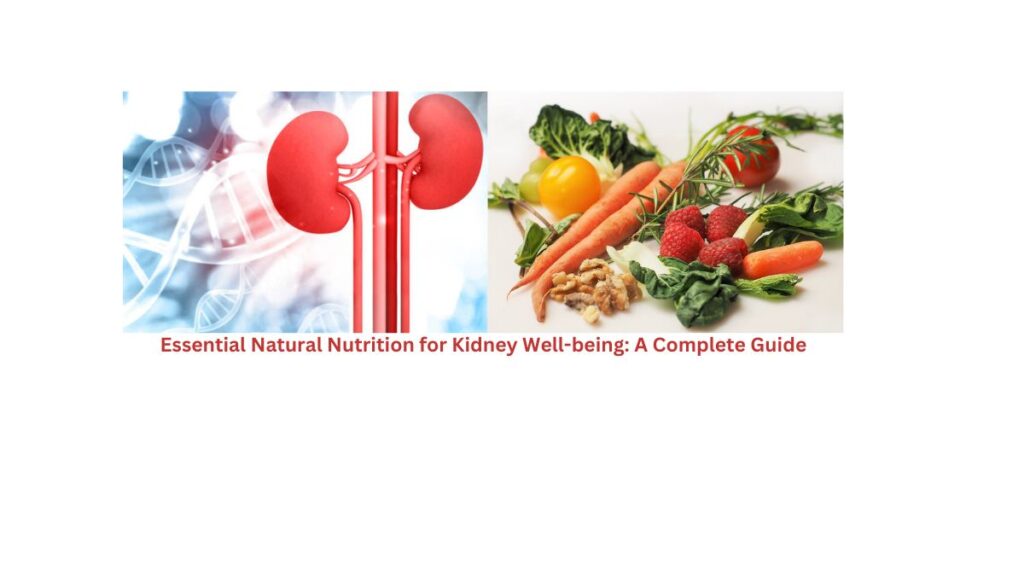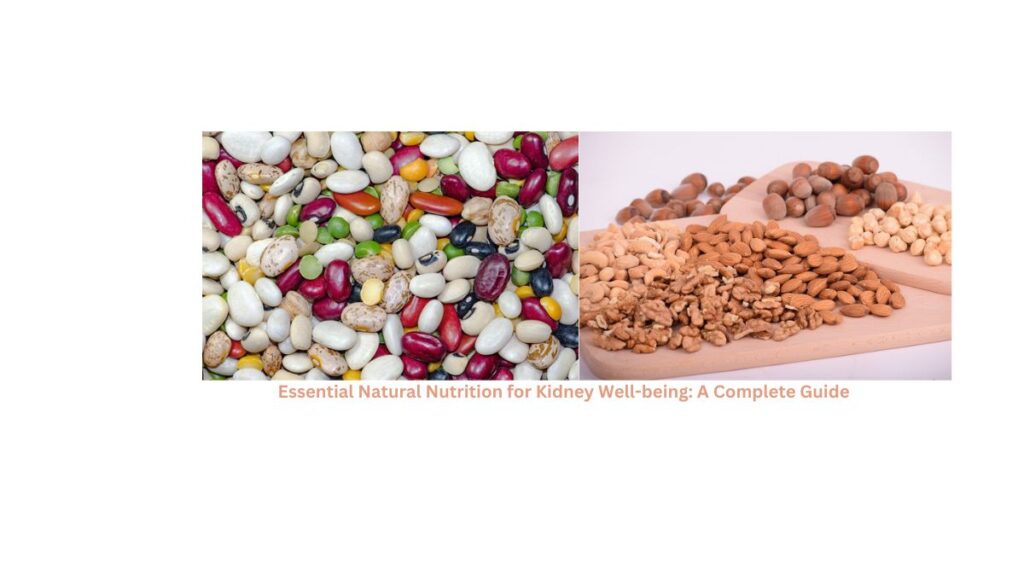Introduction:
Essential Natural Nutrition for Kidney Well-being: A Complete Guide

Ensuring optimal kidney health is crucial for overall well-being, and a significant aspect of achieving this lies in embracing natural nutrition. In this comprehensive guide, we will explore the essential elements of natural nutrition that play a pivotal role in supporting and enhancing kidney function. By understanding the right dietary choices, you can empower yourself to promote kidney well-being and maintain a healthier lifestyle.
1: Essential Natural Nutrition for Kidney Well-being
As we embark on the journey to prioritize kidney health, it’s essential to recognize the key nutrients that play a pivotal role in supporting and sustaining optimal kidney function. In this section, we will delve into the crucial elements of natural nutrition that contribute to kidney well-being, emphasizing the importance of a well-rounded and nutrient-rich diet.

- Hydration: The Foundation of Kidney Health: Begin by reiterating the significance of adequate hydration for kidney health. Water is not only essential for overall bodily functions but is especially crucial for ensuring the efficient filtration of waste and toxins by the kidneys. Encourage readers to maintain a consistent and healthy water intake throughout the day.
- Balanced Diet: A Nutrient-Rich Approach: Advocate for a well-balanced diet that encompasses a diverse range of nutrients, including vitamins, minerals, and antioxidants. Highlight the synergistic effects of these nutrients in supporting kidney health and overall well-being. Emphasize the importance of incorporating a variety of fruits, vegetables, whole grains, and lean proteins into one’s daily meals.
- Limiting Sodium Intake: Discuss the detrimental effects of excess sodium on kidney health. Explain how a high-sodium diet can contribute to hypertension and fluid retention, placing additional strain on the kidneys. Provide practical tips for reducing sodium intake, such as choosing fresh, unprocessed foods and using herbs and spices for flavor.
- Potassium Management: Introduce the role of potassium in maintaining proper fluid balance, nerve function, and muscle contractions. While potassium is an essential nutrient, an imbalance can be harmful. Guide readers on incorporating potassium-rich foods like bananas, oranges, and sweet potatoes in moderation.
- Calcium and Phosphorus Balance: Explore the delicate balance between calcium and phosphorus, emphasizing their importance for bone health and overall kidney function. Provide insights into food choices that promote this balance and discuss the potential consequences of an imbalance, such as complications related to bone and mineral metabolism.
- Healthy Fats and Omega-3 Fatty Acids: Shed light on the positive impact of healthy fats and omega-3 fatty acids, found in sources like fatty fish, flaxseeds, and walnuts. Discuss how these essential fatty acids contribute to reducing inflammation and supporting cardiovascular health, indirectly benefiting kidney function.
In this section, we’ve laid the groundwork for understanding the essential nutrients that contribute to kidney well-being. As we proceed, we’ll delve deeper into specific superfoods and dietary habits that can be adopted to further enhance the health of our kidneys.
2: Understanding the Importance of Kidney Health
The human body is a complex and interconnected system, where each organ plays a vital role in maintaining overall well-being. Among these, the kidneys stand out as unsung heroes, silently working behind the scenes to ensure the body’s internal environment remains stable and healthy. In this section, we’ll delve into the critical role of kidneys and why prioritizing their health is fundamental to our overall bodily functions.

- Filtration of Waste and Toxins: The kidneys act as natural filters, tirelessly working to remove waste products and toxins from the bloodstream. This pivotal function ensures that our blood remains clean and free of substances that could otherwise harm various organs and systems.
- Regulation of Blood Pressure: Beyond waste filtration, kidneys play a crucial role in maintaining optimal blood pressure levels. They achieve this by managing the balance of sodium and water in the body, influencing blood volume, and thus contributing to the overall stability of blood pressure.
- Balancing Electrolytes: Electrolytes, such as potassium and sodium, are essential for numerous physiological processes, including nerve signaling and muscle contractions. Kidneys play a key role in regulating electrolyte levels, ensuring a delicate balance that is critical for the proper functioning of muscles, nerves, and the cardiovascular system.
- Proactive Measures for Kidney Support: Emphasize the importance of taking proactive measures to support kidney function. One of the most effective ways to achieve this is through proper nutrition. By making mindful dietary choices, individuals can contribute to the overall health and longevity of their kidneys.
- The Impact of Lifestyle on Kidney Health: Introduce the concept that lifestyle factors, including diet and hydration, directly influence kidney health. Poor dietary choices, insufficient water intake, and other unhealthy habits can place undue stress on the kidneys, potentially leading to long-term complications.
.
3: Superfoods for Kidney Health

- Berries: Nature’s Antioxidant Powerhouse Explore the antioxidant properties of berries and their role in reducing inflammation and oxidative stress, promoting kidney health. Berries, such as blueberries, strawberries, and raspberries, emerge as nature’s antioxidant superheroes. Delve into the rich array of antioxidants they contain, explaining how these compounds combat inflammation and oxidative stress—the primary culprits behind kidney damage.
- Salmon and Omega-3 Fatty Acids Discuss the benefits of omega-3 fatty acids found in salmon and other fatty fish for reducing inflammation and supporting heart and kidney health.
The Omega-3 Advantage: Dive into the world of omega-3 fatty acids, with a focus on salmon and other fatty fish. Discuss the anti-inflammatory properties of omega-3s, shedding light on how these essential fatty acids contribute not only to heart health but also to the well-being of our kidneys.
- Leafy Greens: A Potassium-Rich Choice Highlight the potassium content in leafy greens and its role in maintaining proper fluid balance and preventing kidney stones.
- Shine a spotlight on the potassium content found in leafy greens like spinach, kale, and Swiss chard. Discuss the role of potassium in maintaining proper fluid balance, regulating blood pressure, and preventing kidney stones.
4.Dietary Habits to Avoid
- Limiting Processed Foods Discuss the negative impact of processed foods on kidney health due to their high sodium and phosphorus content. Encourage readers to opt for fresh, whole foods instead.
- Moderating Protein Intake Explain the importance of balancing protein intake and avoiding excessive consumption, which can strain the kidneys. Provide guidelines for choosing high-quality protein sources.
Conclusion:
Summarize the key takeaways from the guide, emphasizing the transformative impact of incorporating essential natural nutrition into one’s lifestyle for kidney well-being. Encourage readers to consult with healthcare professionals for personalized advice and to make informed dietary choices that align with their specific health needs.





